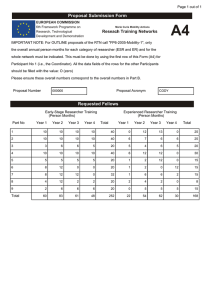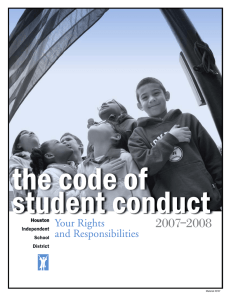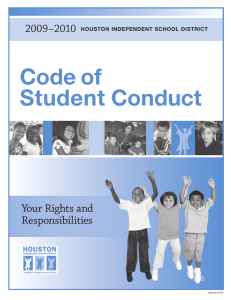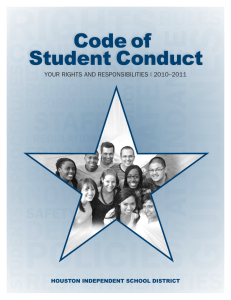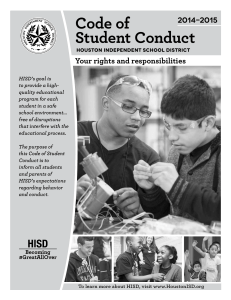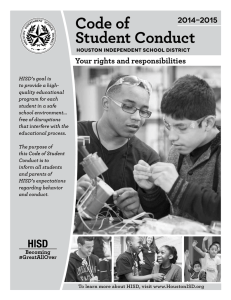WHITLOWE R. GREEN COLLEGE OF EDUCATION Doctoral Proposal Defense Announcement
advertisement
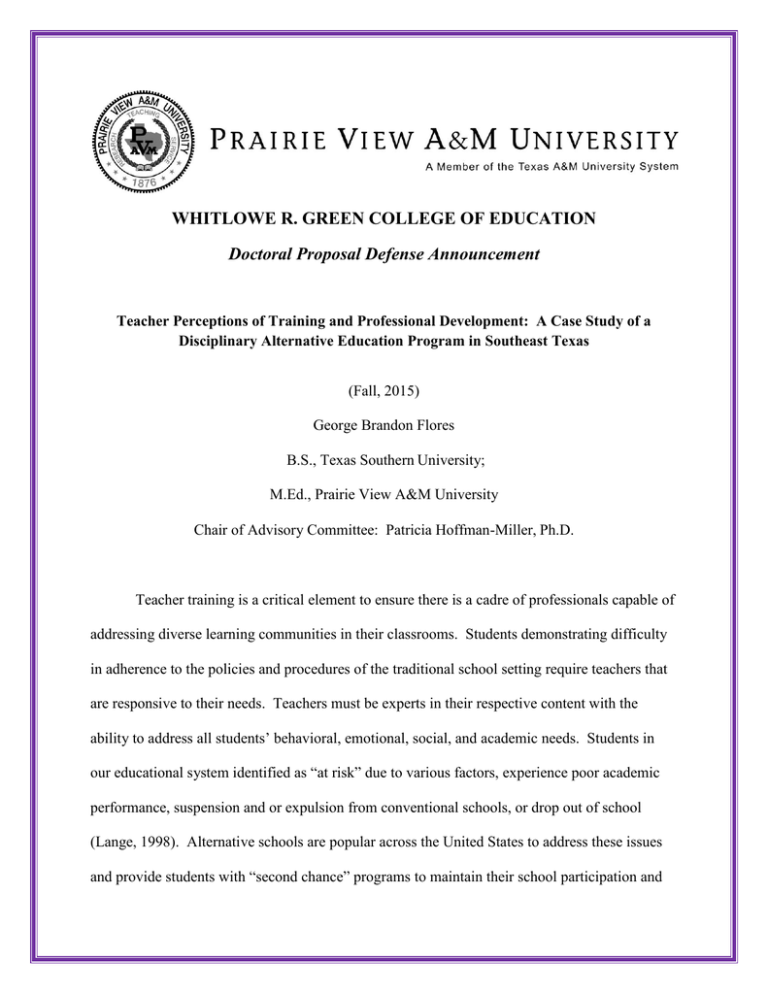
WHITLOWE R. GREEN COLLEGE OF EDUCATION Doctoral Proposal Defense Announcement Teacher Perceptions of Training and Professional Development: A Case Study of a Disciplinary Alternative Education Program in Southeast Texas (Fall, 2015) George Brandon Flores B.S., Texas Southern University; M.Ed., Prairie View A&M University Chair of Advisory Committee: Patricia Hoffman-Miller, Ph.D. Teacher training is a critical element to ensure there is a cadre of professionals capable of addressing diverse learning communities in their classrooms. Students demonstrating difficulty in adherence to the policies and procedures of the traditional school setting require teachers that are responsive to their needs. Teachers must be experts in their respective content with the ability to address all students’ behavioral, emotional, social, and academic needs. Students in our educational system identified as “at risk” due to various factors, experience poor academic performance, suspension and or expulsion from conventional schools, or drop out of school (Lange, 1998). Alternative schools are popular across the United States to address these issues and provide students with “second chance” programs to maintain their school participation and have an opportunity to be successful in an alternative setting. There are several different forms of alternative schools that serve various purposes depending on the intentions of the program. This study will focus on alternative schools that students are assigned to from their home campus as a result of disruptive behaviors, known as disciplinary alternative education placements or DAEP. School leaders face a difficult task considering that thirty percent of beginning teachers do not teach beyond two years and forty percent leave the profession in their first five years of teaching (Perez, Swain, & Hartsough, 1997). More recent studies show that new teachers leave the profession at a rate of closer to fifty percent within their first five years of teaching (Bieler, 2009). With teachers leaving at this rate, it becomes more difficult for schools and students to benefit from the intense ongoing training novice teachers receive at this stage. Teachers require exposure to ongoing training and professional development to ensure they are prepared to enter classrooms. Teachers feeling prepared for their job has a direct relation to job satisfaction, and thus, are more likely to remain in the profession of education. “Fully prepared teachers feel more competent developing curriculum, addressing students’ different learning styles and levels, managing classrooms, motivating students, and knowing how to teach content” (Jorissen, 2002, p. 46). Nowhere is the issue of teacher shortage and retention more prominent than in urban schools, where some of the least prepared teachers are often assigned to teach the most difficult and challenging population of students a district has to offer (Sawka, McCurdy, & Mannella, 2002). In this study, the researcher will explore teachers’ perceptions of the ongoing training and professional development they receive to prepare them for the behavioral and academic challenges faced in the education of students at a disciplinary alternative education program. Continuing professional development of teachers is crucial for improving schools, increasing teacher quality, and improving student learning (Opfer & Vedder, 2011). With the behavioral and academic challenges teachers face while teaching at a DAEP, they must have a comprehensive framework to address individual student needs. The researcher hopes to identify what teacher’s feel they need to be successful in an alternative school and what training needs to be provided to best serve students in this setting. The researcher selected The Whole Teacher Approach as the conceptual framework to support the study and guide the research of professional development. The Whole Teacher Approach centers the framework on the idea that teacher’s improving their practice is best developed through ongoing support in real classroom settings where teachers are provided an opportunity to receive coaching and feedback after professional development to support their teaching in the classroom. The three components of The Whole Teacher Approach are interrelated where each area is approached in a cohesive and comprehensive way that acknowledges the complex process of teacher development (Chen & McCray, 2012). The Whole Teacher Approach identifies four unique qualities that distinguish from other professional development offerings. Specifically, Whole Teacher professional development must be (a) multidimensional, (b) integrated, (c) developmental, and (d) contextualized (Chen & McCray, 2012). Whole Teacher begins with targeting multiple dimensions of PD specific to teacher’s attitudes, knowledge and practices. All three variables are equally important, but offer teacher’s multiple ways of learning that meets their needs. These multi-dimensions to learning offer multiple pathways to obtain knowledge and improve practice due to the various and multiple needs of individual teachers. The Whole Teacher Approach framework allows for prescriptive coaching of teachers that allows for varied levels of coaching support as the teacher develops throughout the coaching cycle. The purpose of this qualitative study is to understand teacher’s perceptions of training and professional development they receive to prepare them to address students’ behavioral and academic needs from at a disciplinary alternative education program. Understanding teachers’ needs can help DAEP’s develop the ongoing professional development and training necessary to keep teachers feeling prepared, ensure students are adequately being served in the classroom, and in turn can impact teacher recruiting, hiring, and retention. The following research questions will guide this study: 1. What type of specific training and ongoing professional development do teachers perceive is needed to better serve students at a DAEP? 2. Will an ongoing and prescriptive framework of training and professional development have an impact on how well prepared teachers feel in the classroom to address student’s behavioral and academic needs? 3. Will an ongoing and prescriptive framework of training and professional development have an impact on teacher’s wanting to remain teaching at their respective DAEP? In this study, the researcher will employ a case study approach using qualitative methods to examine teachers currently assigned to a Disciplinary Alternative Education Program. This study will focus on a DAEP located in an urban school district in Southeast Texas. The researcher is focused on examining the selected participants’ perceptions of the current training and professional development program at their current campus and how these perceptions impacted their beliefs on what is needed to improve teacher capacity at DAEP’s to best serve students. The researcher hopes to understand what training teachers feel is available to them at the selected DAEP and identify what training and professional development teachers feel they need to be successful in a disciplinary alternative school. The participating teachers will also have the opportunity to offer insight on what training they feel needs to be provided to best serve the students in this setting. References Bieler, D. (2009). Getting past getting started: How to improve new teacher retention. Language Arts, 86(6), 464-467. Chen, J., & McCray, J. (2012). A conceptual framework for teacher professional development: The whole teacher approach. National Head Start Association, 15(1), 8-23. Jorissen, K. T. (2002). Retaining alternate route teachers: The power of professional integration in teacher preparation and induction. The High School Journal, 86(1), 45-55. Lange, C. M. (1998). Characteristics of alternative schools and programs serving at-risk students. The High School Journal, 81(4), 183-197. Opfer, V. D., & Vedder, D. G. (2011). Conceptualizing teacher professional learning. Review of Educational Research, 81(3), 376-407. Perez, K., Swain, C., & Hartsough, C. (1997). An analysis of practices of practices used to support new teachers. Teacher Education Quarterly, 24 (2): 41-52. Sawka, K. D., McCurdy, B. L., & Mannella, M. C. (2002). Strengthening emotional support services: An empirically based model for training teachers of students with behavior disorders. Journal of Emotional and Behavioral Disorders, 10(4), 223-232. Date: December 2, 2015 Department: Educational Leadership and Counseling Time: 1:00 Location/Room: DELCO 220__________________ _______________ Dissertation Chair: __Patricia Hoffman-Miller, PhD. Dissertation Committee Members: __Douglas Hermond, Ph.D.__ _ Lisa Thompson, Ph.D.___ __Solomon Osho, Ph.D.____

